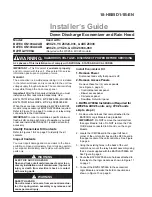
10
INSTALLATION OF INDOOR
ENGLISH
Piping insulation
- Loosen the flare nut of the indoor unit's piping connection port, insert it into the liquid pipe and
the gas pipe, and then conduct flaring work on the ends of each pipe.
- Insulate each of the liquid pipes and gas pipes using insulation material for piping.
- Use the piping insulation included in the accessories to once again insulate the piping
connection part of the gas pipe as shown below. (Piping insulation must be at least
19 mm thick)
Ⓓ
Insulation material
Ⓔ
Communication
cable
Ⓐ
Liquid piping
Ⓑ
Gas piping
Ⓒ
Power cable
Separate
Communication
cable
Electrical
wire
Fully insulate the connection parts.
Indoor unit
main body
Piping insulation
material (accessory)
Insulation material for connecting
piping (sold separately)
Band
Have them overlap.
Adhere so that there are no gaps.
applies to
Insulation material standard
(mm)
(besides normal conditions for
residential use)
Insulation material standard (mm) - residential
Insulation material
standard (mm)
(unfavorable
conditions)
If installed in an air-conditioned
place (CASE 1)
(ex: bedroom, living room, etc.)
If installed in a non-air-
conditioned place (CASE 2)
(ex: hallway, outdoors, etc.)
Refrigerant piping
dimensions (mm)
EPDM
EPDM
EPDM
EPDM
Gas piping
6.35
9.52
12.7
15.88
19.05
22.22
25.40
28.58
31.75
38.1
44.45
19
19
19
19
19
19
19
19
19
25
25
13
13
13
13
13
13
19
19
19
19
19
19
19
19
19
19
19
19
19
19
25
25
19
25
25
25
25
32
32
32
32
32
32
Liquid
piping
6.35
9.52
9
9
9
9
12.7~44.45
13
13
13
13
• Normal conditions: Temperature of 30 °C, relative humidity of 85 %
• Unfavorable conditions: Temperature of 30 °C, relative humidity of 90 % (humid places such as
bathrooms, swimming pools, etc.: air supply and exhaust fan installation)
Summary of Contents for ABNW18GM1S1
Page 24: ...24 ENGLISH ...
Page 25: ......











































